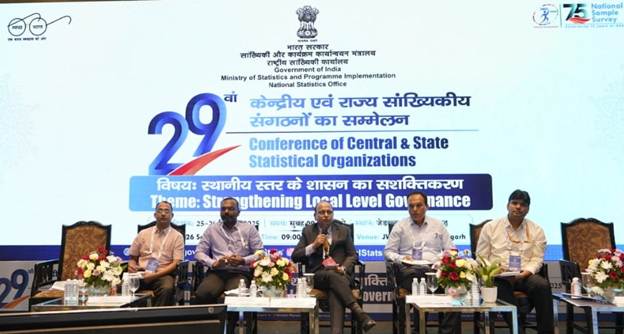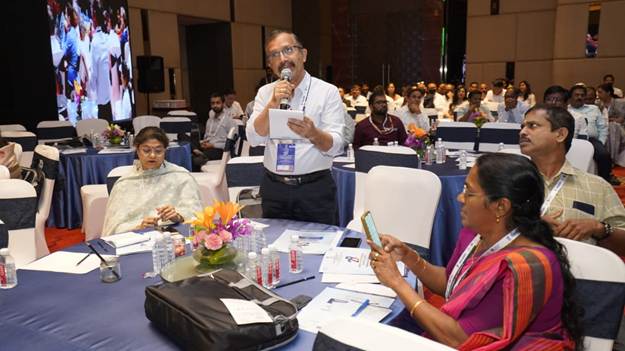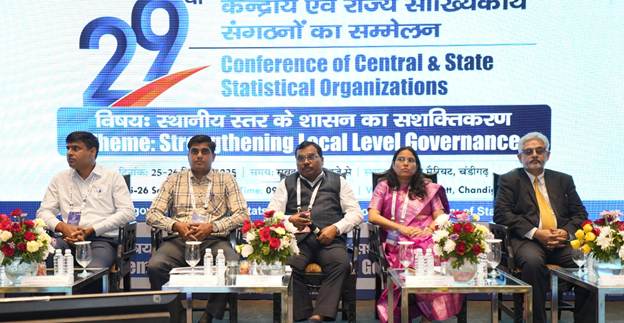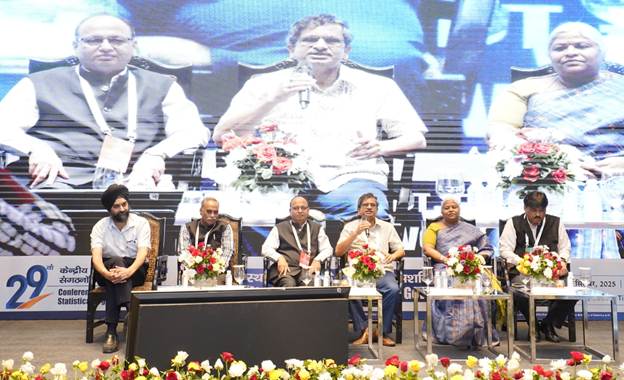Ministry of Statistics & Programme Implementation
“Strong local governance begins with strong local data, as statistics translate community needs into concrete plans”: Union Minister Rao Inderjit Singh, MoSPI
“Any scheme is effective only when it is backed by reliable statistics”: Shri Nayab Singh Saini, Chief Minister of Haryana
“High-quality data is important for effective decentralized planning”: Shri Bhawani Singh Pathania, Deputy Chairman, State Planning Board, Himachal Pradesh
Theme of Conference of Central and State Statistical Organizations (CoCSSO): Strengthening Local Level Governance
Posted On:
26 SEP 2025 5:21PM by PIB Delhi
The Ministry of Statistics and Programme Implementation (MoSPI) organized the 29th Conference of Central and State Statistical Organizations (CoCSSO) during 25th and 26th September, 2025 at Chandigarh, which concluded on 26th September, 2025. The theme of this year's COCSSO was ‘Strengthening Local Level Governance’. The conference was fruitful in bringing together more than 30 States/UTs Departments [Planning, DES & Statistical Organizations]; Central Ministries/ Departments, experts from various other national & international organizations such as Indian Statistical Institute (ISI), Indian Agricultural Statistics Research Institute (IASRI), Indian Council of Agricultural Research (ICAR), International organisations such as World Bank, UN agencies and other stakeholders to deliberate on strengthening statistical systems for evidence-based governance and achieving the vision of Viksit Bharat.
The inaugural session of 29th COCSSO held on 25th September 2025 was graced by distinguished dignitaries including Rao Inderjit Singh, Union Minister of State (Independent Charge) of the MoSPI, Ministry of Planning and MoS in Ministry of Culture; Shri Nayab Singh Saini, Chief Minister of Haryana; and Shri Bhawani Singh Pathania, Hon’ble Deputy Chairman, State Planning Board, Govt. of Himachal Pradesh.
Rao Inderjit Singh, Union Minister of State (Independent Charge) of the MoSPI emphasized that strong local governance begins with strong local data, as statistics translate community needs into concrete plans. With the rising demand for timely, reliable, and disaggregated data, statisticians play a vital role in ensuring accurate interpretation and evidence-based decision-making. Good governance at the local level requires granular, credible data to guide planning, track progress, and enable course correction, making the strengthening of local statistical systems inseparable from effective local governance. Shri Nayab Singh Saini, Chief Minister of Haryana highlighted that any scheme is effective only when it is backed by reliable statistics and hence need for strong collaboration between Centre and States is pivotal for realizing India’s vision of Viksit Bharat 2047. Shri Bhawani Singh Pathania, Deputy Chairman, State Planning Board, Himachal Pradesh, highlighted that the high-quality data is important for effective decentralized planning and role of statistical information for empowerment of local governments via the 73rd and 74th Amendments. As part of the conference highlights, MoSPI also launched several major initiatives, including the release of Children in India 2025 and Environmental Accounting on Forests – 2025, along with the launch of the PAIMANA Dashboard, the NMDS 2.0 Portal, and the revamped MoSPI website with the iOS version of the GoIStats app. These initiatives, aimed at enhancing statistical dissemination, integration, and accessibility, further strengthen the foundations of evidence-based governance and citizen engagement.
During the two-day conference, a wide range of technical sessions were held around the central theme of strengthening local-level governance through robust statistical systems.
On Day 1 (25th September 2025), deliberations covered the revamp of the Support for Statistical Strengthening (SSS) scheme, with Odisha sharing its digital transformation of DES; the implementation of the MPLAD scheme, with Himachal Pradesh highlighting convergence practices; the preparation of the Statistical Business Register (SBR) and base year updation of the Index of Industrial Production (IIP) with insights from Karnataka; and enhanced collaboration with States on survey activities, where Uttar Pradesh presented its model-based district-level estimates.
Discussions also focused on the revision of GDP/GSDP base years, with Haryana sharing its state experience, and on the base updation of CPI and development of sub-State indices, with Maharashtra showcasing its district-level CPI initiative. The day concluded with a presentation on MoSPI’s research and innovation initiatives, including showcasing use cases of applications of Artificial Intelligence and Machine Learning in official statistics, complemented by Karnataka’s digital innovations in vital statistics and geospatial mapping.
On Day 2 (26th September 2025), the sessions shifted focus to advancing Sustainable Development Goals (SDGs) frameworks and institutional capacities. Sessions covered MoSPI’s National Indicator Framework and State experiences in localizing SDG monitoring, with Rajasthan sharing its multi-tier approach to State, district, and block-level indicator frameworks. Thereafter, UNDP representative highlighted the importance of State Indicator Frameworks (SIF), District Indicator Frameworks (DIF) and Local Indicator Frameworks (LIF). Discussions also highlighted the importance of harmonization of datasets for drawing insights in today’s changing data eco-systems and definitional convergence, where the Department of School Education and Literacy presented UDISE+ as a model of real-time, standardized data collection in education. The day concluded with a focus on strengthening human resource capacities, with MoSPI’s NSSTA and Tamil Nadu emphasizing on structured training, institutional collaboration, and systemic improvements to strengthen the capabilities of statistical officials to meet challenges of emerging data needs.
The valedictory session on 26th September 2025 marked the culmination of one and a half days of engaging technical sessions on the theme Strengthening Local Level Governance. In his concluding remarks, Dr. Saurabh Garg, Secretary, MoSPI, emphasized that strengthening the Directorates of Economics and Statistics (DES) must be a priority, urging each State to prepare a clear roadmap where manpower augmentation is a key element, with the Center ready to provide support where needed. He highlighted that while traditional assets are land, labour, and capital, in today’s governance data must also be recognized as a strategic asset—but only when it is harmonised, reliable, and of sufficient granularity to be effectively used by policymakers for evidence-based planning and decision-making.
Shri A.K. Sadhu, Member, National Statistical Commission (NSC), expressed that while the conference formally concludes, the coordination and connection among statistical systems must continue. He called for sustained collaboration not only between the Centre and States but also among States themselves, so that mutual learning can further strengthen India’s statistical system.




***
Samrat/Allen
(Release ID: 2171778)
Visitor Counter : 720